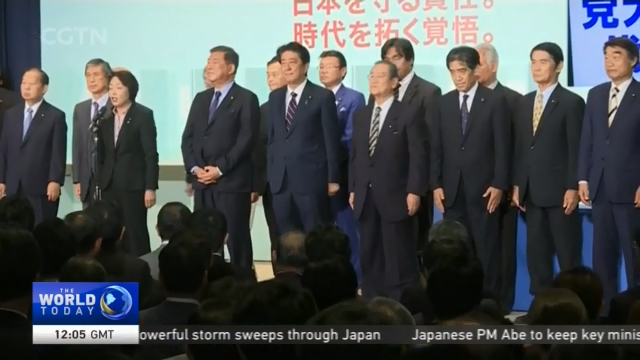
20:28, 02-Oct-2018
Abe Cabinet Reshuffle: New cabinet fails to persuade Abe's doubters
Updated
19:38, 05-Oct-2018
02:33

Japanese Prime Minister Shinzo Abe announced his new cabinet Tuesday after winning the party leadership election again in mid-September. Abe was hoping to show a strong, stable leadership with his new cabinet, but observers are not convinced. Terrence Terashima has more from Tokyo.
A shaky start to Shinzo Abe's final term as Japanese Prime Minister. Experts say he fell short of forming a cabinet, portraying stability and commitment, due to internal politics. He returned key ministers to certain posts, namely the Chief Cabinet Secretary, Foreign Minister and all related economic ministers. Experts say this means the cabinet's basic policies will remain the same. Abe, who prioritized female empowerment throughout his campaign, managed to appoint only one woman, conservative lawmaker Satsuki Katayama. The cabinet has 12 new ministers, something the Japanese media mocked as "inventory readjustments". The move evenly satisfied factions in the ruling Liberal Democratic Party. Nonetheless, Abe is pushing forward with his long-cherished plan to revise the Japanese constitution, hoping to pass the bill as early as next summer.
JEFF KINGSTON, DIRECTOR OF ASIAN STUDIES TEMPLE UNIVERSITY, JAPAN CAMPUS "He has less than a year to get his legacy agenda in order, because once that upper house elections are run, nobody owes him anymore, and a lot of those seats are vulnerable."
Many LDP lawmakers are already looking forward to post-Abe leadership. On diplomacy, fending off trade and security pressures from US President Donald Trump will be key in maintaining Japan's security and domestic industries. New trade talks may only be temporary solutions.
JEFF KINGSTON, DIRECTOR OF ASIAN STUDIES TEMPLE UNIVERSITY, JAPAN CAMPUS "Japanese companies and supply chains all connect through China. So a trade war against China will definitely have collateral damage on Japan, so we are certainly not out of the woods yet, Typhoon Trump can still do a lot of damage and Abe is doing his best in damage control."
Abe seeks to enhance diplomacy with China, South Korea and Russia. At home, boosting Japan's stagnant economic recovery and securing social welfare are paramount in retaining public support.
TERRENCE TERASHIMA TOKYO, JAPAN "Next on Prime Minister Shinzo Abe's itinerary is the bilateral summit with Chinese President Xi Jinping in Beijing, then he will convene an extraordinary diet session where he is expected to submit a draft for the constitution revision, Terrence Terashima, CGTN Tokyo."

SITEMAP
Copyright © 2018 CGTN. Beijing ICP prepared NO.16065310-3
Copyright © 2018 CGTN. Beijing ICP prepared NO.16065310-3